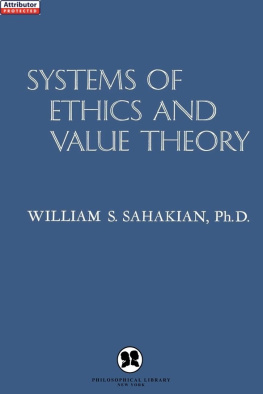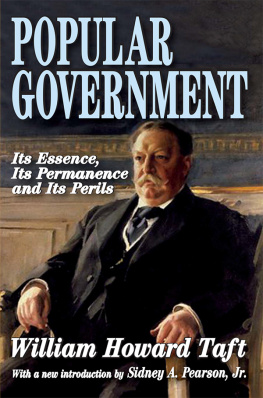PREFACE
The legal profession discharges a most important function in a civilized community, and it seems to me that a discussion of the ethics and ideals of that profession would come within the purpose of the Page foundation, which is described by the donor as intended to promote "the ethical side of business life, including the morals and ethics of public service." I shall first ask your attention to the history of the profession, which shows that a paid advocacy is the only practical system, and to the rules of conduct to which lawyers must be held in order that such a system shall promote justice. I cannot claim to have any peculiar knowledge upon this subject other than that derived from a somewhat brief practice of five years at the Bar, from an experience of eleven years on the Bench of trial and appellate courts, from a somewhat varied experience in the responsibility of government, not only in this country, but in those far-distant isles of the Pacific in which the United States has been grafting the principles of free government upon a civilization inherited from Spain.
CHAPTER I
HISTORY OF THE PROFESSION OF LAW
It is not too much to say that the profession of the law is more or less on trial. It is certain that there is a crisis in the life of our courts, and that a great political issue is being forced upon the people, for they must decide whether the courts are to continue to exercise the power they now have, and what character of service they shall be required to render. Judges are lawyers. They ought to be trained practitioners and learned in the profession of the law before they ascend the Bench, and generally they are. Therefore, our courts, as they are now conducted, and our profession, which is the handmaid of justice, are necessarily so bound together in our judicial system that an attack upon the courts is an attack upon our profession, and an attack upon our profession is equally an attack upon the courts.
We have all noted on the stage and in the current literature the flippant and sarcastic references to the failures of the administration of justice, and we are familiar with the sometimes insidious and too often open impeachments of the courts, which appear in the press and upon the hustings. They are charged with failure to do justice, with bad faith, with lack of intelligent sympathy for socially progressive movements, with a rigid and reactionary obstruction to the movement toward greater equality of condition, and with a hidebound and unnecessarily sensitive attitude of mind in respect to the rights of property. One count that looms large in the wide range of the indictment against our judicial system is the immoral part that lawyers are said necessarily to play in the perversion of justice by making the worse appear the better reason. Such a public agitation and such an issue in politics lead to a consideration of the fundamental reasons for the existence of our profession in the past, and a further inquiry as to the need for it in the future, as preliminary to a discussion of the rules of conduct that should govern its practice.
There are those who intimate that we can learn nothing from the past. They don't say so in so many words, but they proceed on the theory that man, under the elevating influences with which they propose to surround him, is suddenly to become a different creature, prompted by different motives. But those of us who have been fortunate in having an education permeated with an atmosphere of common sense, and an idea of how to deal with human nature as it is, realize that the world is not to be reformed tomorrow or in a month or a year or in a century, but that progress is to be made slowly and that the problems before us are not so widely different from those which were presented to our ancestors as far back as the Christian era. Nor can we fail to derive some benefit from a consideration of such troubles, tribulations and triumphs of our profession in the past as suggest rules of conduct for lawyers in the future. I do not mean that we are not to aspire for better things. Nor do I wish to deny us the happiness of hope for reasonable and real progress toward higher ideals. I simply insist that we ought not to ignore the lessons of experience when we deal with conditions as they are and as everybody who is familiar with them knows them to be.
The three civilizations in which we may most profitably study the growth and development of the legal profession are the Jewish, the Roman and the English. Among the Jews, the Mosaic law, which went into the smallest details of personal life, was the guide to their rule of action. As it had religious sanction, the high priests became the actual ministers of justice and the preservation of religion and law was united in them. Acting as their assistants, and as assessors in the tribunals of which the high priests were the head, were the Scribes. They were learned in the law; had a religious and priestly character themselves; interpreted the Mosaic law with a view to its application to the various facts and issues which arose; and were in addition the teachers of law. It was to them that the rabbinical injunction was made "to make the knowledge of the law neither a crown wherewith to make a show, nor a spade wherewith to dig." And again it was said, "He who uses the crown of the law for external aims fades away."
In describing the principles of non-remuneration to the Scribes, the learned German Professor Schurer says: "In Christ's censures of the Scribes and Pharisees, their covetousness is a special object of reproof. Hence, even if their instruction was given gratuitously, they certainly knew how to compensate themselves in some other way." And it is because of this evasion of this rule that we find those passages in the eleventh chapter of Luke, the 46th and 52d verses, which read:
Verse 46. "And he said, Woe unto you also, ye lawyers! for ye lade men with burdens grievous to be borne, and ye yourselves touch not the burdens with one of your fingers."
Verse 52. "Woe unto you, lawyers! for ye have taken away the key of knowledge: ye entered not in yourselves, and them that were entering in ye hindered."
The line between the judicial and advisory functions of the Hebrew Scribes was not closely or clearly drawn. They were evidently supposed to occupy a disinterested position toward those who consulted them and to be in a sense the associates of the judges. Since the motive which prompted their study of particular cases was supposed to be only that of vindicators of general justice, the rules which nominally guided their action, as announced by the lawgivers, required that their services should always be gratuitous. But quite naturally their consultation with private litigants prompted such litigants to influence their view of the law, and command their skill in debate. And so to evade the rule which prevented remuneration they established the custom of giving presents in advance. These presents given in advance to secure the kindly favor of the Scribes are interesting as the precursors of that institution dear to every English barrister, and not unknownnor even objectionableto American lawyers, to wit, the Retainer. In fact it was the impossibility of finding men who could remain judicial in their attitude when the thought of remuneration moved them to advocate the cause of one of the litigants, that put the Scribes of those days in an indefensible position and led to the attacks upon them that we find in the New Testament.








